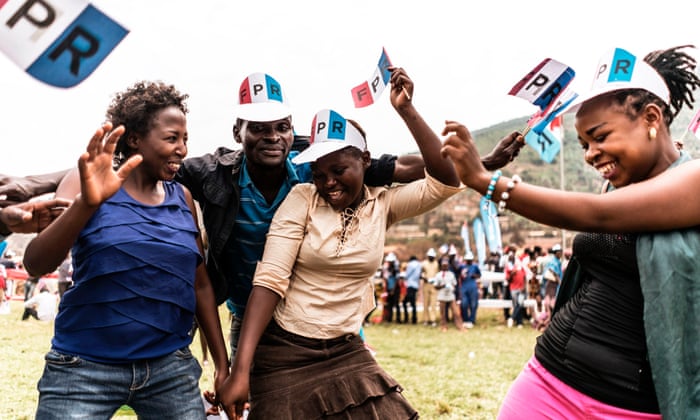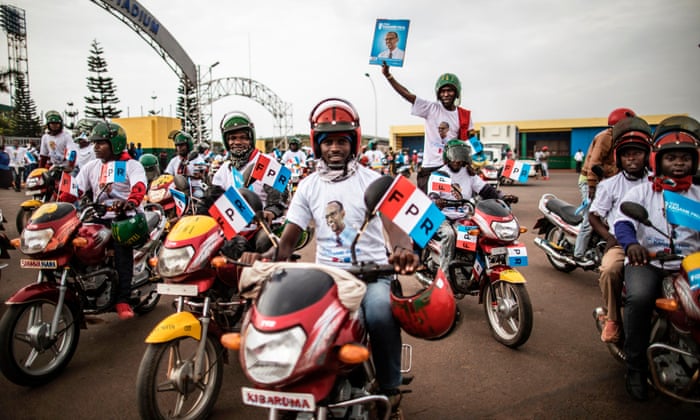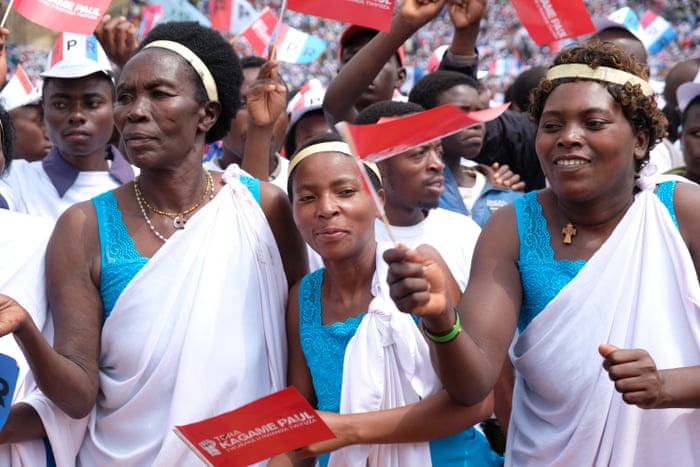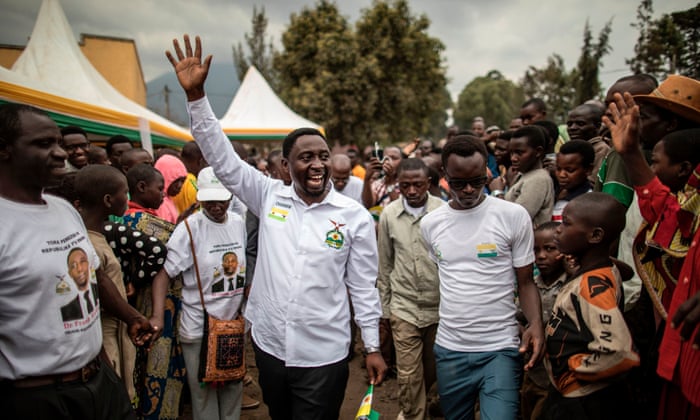A Brief Colonial History Of Ceylon(SriLanka)
Sri Lanka: One Island Two Nations
A Brief Colonial History Of Ceylon(SriLanka)
Sri Lanka: One Island Two Nations
(Full Story)
Search This Blog
Back to 500BC.
==========================
Thiranjala Weerasinghe sj.- One Island Two Nations
?????????????????????????????????????????????????Thursday, August 3, 2017
Divisive Kagame set for third landslide as Rwandans prepare to go to polls
Friday’s presidential election is a one-horse race for Paul Kagame, revered by some as a visionary leader but reviled by others as a ruthless despot
Supporters of the governing Rwanda Patriotic Front dance during a campaign rally in Kigali. Photograph: Marco Longari/AFP/Getty Images
 Jason Burke in Kigali-Thursday 3 August 2017
Jason Burke in Kigali-Thursday 3 August 2017Millions of Rwandans will cast their votes on Friday in the country’s third presidential election since an estimated 800,000 people were killed in a genocide in the central African country 23 years ago.
Few doubt the result of what even the most fervent supporters of the incumbent Paul Kagame admit is a one-sided contest.
One of Africa’s most divisive figures, Kagame is seen by many as an incorruptible and visionary leader who has brought security and development to a nation shattered by civil war and mass killings, yet he is reviled by others as a ruthless authoritarian propped up by a gullible and guilty international community.
The 59-year-old former rebel commander, in power for 17 years, won polls in 2003 and 2010 with 93% and 95% of the votes cast, and is standing for a third seven-year term following a constitutional reform which waived a previous two-term limit and was approved by 98% in a referendum.
Only two opposition candidates have been allowed to stand against him in this week’s poll, and neither is expected to make any significant impact.
At one vast rally organised by the ruling Rwandan Patriotic Front (RPF) party earlier this week in Burera, a northern district, Kagame told crowds that “elections mean choice”, exhorting them to “choose what is good for you”.

Moto taxi drivers hold flags of the governing Rwanda Patriotic Front at the start of a parade in Kigali. Photograph: Marco Longari/AFP/Getty Images
The poll in Rwanda is one of three major elections in sub-Saharan Africa this month, which are seen by experts as indicating the direction of political travel across the continent. Others are taking place in Kenya and Angola. In recent years, democratic gains made in the 1990s and 2000s have been rolled back in many parts. Many fear violence and chaos may follow the Kenyan poll next week.
In his speech at Burera, Kagame told local farmers, who filled a village playing field decked in the blue, white and red of the RPF, that he hoped to continue the work of development that has transformed Rwanda into one of the most economically successful countries in east and central Africa.
Esperance Nyirabyabuze, a 46-year-old farmer, had travelled two hours by boat and on foot to reach the rally.
“I came because he loves us. He gave us cows, brought schools for our children, a road, and kept everything peaceful. I can never imagine having another president,” Nyirabyabuze said.
As she spoke, a party official warmed up crowds, telling Kagame, who travelled with a fraction of the attendants and vehicles that accompany most African heads of state, that those present “remember the day when we were refugees … you opened our minds to think big”.

The Kagame rally in Burera. Photograph: Jason Burke for the Guardian
Kagame was only 36 when he led rebel forces into Kigali, the Rwandan capital, in 1994 to overthrow a Hutu ethnic supremacist regime and end the killing of members of the Tutsi minority and other moderate Hutus.
As minister of defence and vice-president from then until 2000, and then as president, he fought further wars but also stabilised his country, pouring massive efforts into constructing both its infrastructure and a new national identity. Growth rates have been consistently high, with Kigali transformed from a charnel house into a city of clean roads, traffic lights, shiny new hotels and conference centres.
However, there is a darker side to Rwanda’s recent history which has prompted widespread concern. Human rights organisations allege the striking order in cities is in part a result of brutal police operations to “clean the streets” while opposition activists, many in exile, claim Kagame runs a “police state”, jailing journalists and assassinating dissidents, even overseas. Others question the reliability of the economic statistics showing growth and allege that growing cronyism could undermine economic progress.
“No one who looks at Rwanda can be optimistic. There is gross inequality … There is no trust between people: a husband is encouraged to denounce a wife; a child a parent … That means it is highly unstable,” said Justin Bahunga, a London-based opposition activist.
Amnesty International said last month that “decades of attacks on the political opposition, independent media and human rights defenders have created a climate of fear in Rwanda”.
Rwandan officials say such claims are exaggerated. “There is no single form of democracy, anywhere in the world. We have the way that is right for Rwanda, taking into account the context, and the will of the people … We are fully confident the results on 4 August will reflect the feelings and choice of Rwandan voters,” said Gasamagera Wellars, the presidential spokesman.
Kagame’s relationship with Washington and London has long been complex. Many in both capitals believe the Rwandan leader’s accomplishments outweigh human rights concerns. Tony Blair and Bill Clinton are admirers.
The best known of the two opposition candidates allowed to run against Kagame is Frank Habineza, a 40-year-old journalist who leads the Green Democratic party. The party’s vice-president was murdered in 2010.
Speaking before a rally in the small southern town of Rango, Habineza said the authorities were “starting to understand the opposition can play a role in running the country”.
“We are still treated as if we are enemies … but so far in this election no one in our party has been killed or imprisoned or harassed and that means at least some progress,” he said.

Habineza greets a small crowd of supporters at an election rally in Burera. Photograph: Marco Longari/AFP/Getty Images
Young people in Rango complained it was hard to find a steady, well-paid job. Ignatius Dusabe, a 20-year-old student, praised Kagame and the RPF for “doing many things” for Rwanda but added there were many “wise men in Rwanda” who could collaborate to govern.
Nic Cheeseman, an expert in African democracy at Birmingham University, said Kagame was trying to “re-establish himself as one of the good reform guys, not one of the dodgy dictators”.
“Holding elections is the smart option … they allow leaders to be internationally respectable, mobilise people and allow a fresh influx of talent into their own parties. Research shows controlled elections prolong regimes and Kagame has the sweet spot of elections that are controlled enough to bring advantages but not to threaten him,” Cheeseman said.
One obvious question is Kagame’s succession. If he serves out the three terms now permitted by the recent referendum, the Rwandan president will be 76. Officials say the president is aware of the challenge of any transition and the question is being “actively discussed” within the RPF.
“There is no need to let anyone else try … I want him to keep on being president for a long time,” said Florence Uwamahoro, 29, moments before Kagame arrived at the Burera rally.

